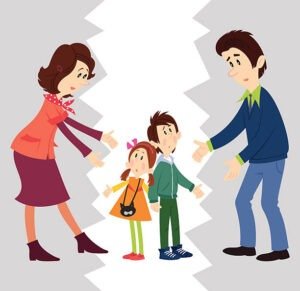Everyone wants their children to be happy so it’s very upsetting when your child returns from parenting time with your Ex and they are angry, extra quiet, upset, or out-of-sorts in any way. It’s natural for your first thought to be that it is because of your Ex – after all, your child was acting perfectly normal before they left your house! But sometimes the answer is a little more straight forward: having parents in two different places is tough. For kids of all ages, life becomes unglued when parents begin living apart.
Don’t underestimate how easy it is for your child to feel lost, abandoned, or unloved – these reactions are almost universal in children. What will they miss out on when they leave one parent’s home? When they are gone, will their parent still be thinking about them? ‘Home’ represents a place of security, peace, and attachment. To divide home into two parts is a challenge.

It’s really hard for kids to adjust to these new circumstances.

Moving back and forth between homes is very difficult for children whether they are infants or young adults. It’s hard to feel as if one home is truly ‘theirs’ because they are never in the same place every single night of their lives. Some kids are more flexible and easy going than others, but it is a huge adjustment for any personality. On average, it takes kids two years to fully adjust to separation and divorce and studies show that families often hit a low point about one year out from the initial separation.
Common signs of transition stress vary by age, but across the board you’ll see some change in personalities.
- Infants will often be angry with the primary caregiver after a prolonged absence. They will be needy but not easily soothed.
- Younger children will be melancholy and demanding.
- Older kids tend to be withdrawn and possibly aggressive.
While older children may want some time alone, younger kids may need your undivided attention. It can be helpful to leave open an hour or two after the transition to spend solely on your child without any disruptions. You might need to set the exchange time to take this into consideration.
New circumstances may just produce different behavior.
Sometimes kids take advantage of their parents’ turmoil and their difficulty enforcing the rules. It’s natural for them to test boundaries at any time but right now they may be testing you because they are upset or need more attention. They might just see a way to have more freedom or get more stuff!
Rules and structure give even older children a sense of stability and comfort. Even though many protest, they want to know that there is a family unit behind them that cares and is paying attention. That means sticking to standard rules and boundaries and absorbing their angst when they lash out against restrictions.

If your children are being disrespectful, rude, or hurtful, the best thing you can to is to have a thick skin: emphasize communication and unconditional love. Of course it’s okay to draw the line with what is appropriate behavior but recognize this is coming from a place of hurt and fear.
It’s hard to give more of yourself than normal when you are under so much stress but your kids really need you right now, so be patient.
Sometimes kids aren’t sure how you want them to act.

When children feel pulled in two different directions by their parents, they know that to please one parent is to hurt or anger the other. Children may be withdrawn returning from your Ex’s home because they are not sure how to respond or act that won’t illicit negative emotions from you. They don’t want to see you hurt or angry and that might happen if they divulge too many details or say the wrong thing.
It’s a fine line to walk because you want to make sure your child is always safe so you want to know what happened while they were gone, but sometimes giving children some space and allowing them to come to you on their own timeline will give you more information than questioning them. Of course, allowing them to speak freely about their parenting time with your Ex – without judgment or reaction – will quickly rule this out as a cause for behavioral change.
If you allow your kid to share all of their life with you without fear of judgment, you will be able to feel closer to them, and know more about what they do and how they see things when they are not immediately with you. This will benefit you for their entire life.
The best way to help your kids is to give of yourself and accept you might not be able to fix everything.
Sometimes when your child shares a concern or problem – or simply throws his backpack down in frustration – he doesn’t want you to solve the problem for him or tell him what to think, feel or do. He mostly needs you to care, listen, and be present so that he feels heard and understood. This isn’t necessarily a problem that can be solved.
If the behavior is stemming from the stress of the separation, you can’t make that hurt and reality go away. You can’t make your kids just ‘understand’ or be happy with this change in their life. You guys are going to have to go through this process togehter and work it out together.

Parents may often be disinclined to talk about their children’s feelings because they are afraid that drawing attention to those negative feelings will make the child experience them more strongly, but usually just the opposite happens. When you gently inquire about your child’s feelings – even the negative ones – your child feels more loved and nurtured, which helps the negative feelings dissolve. Don’t avoid calling attention to your child’s hurt and anger; more often it will help with their healing because they don’t have to feel all of these emotions alone.
The scariest fears are the ones we are afraid to let loose from our heads. Once spoken, many fears lose their power and control.
To help you children process general emotional distress, try to use ‘Active Listening’.
- Show that they are the main focus and what they say is important: nod your head, make eye contact, show a relaxed body posture. Use words and phrases to show listening and caring: make brief verbalization such as ‘I see,’ ‘okay’, and ‘go on.’
- Restate what your child tells you to make sure you understand that the words they used conveyed what they feel. Ask, “is that right?”
- It’s okay to ask for more information but try to make your questions general, such as ‘what happened next?’
- Listen for feelings. Depending on your child’s age it may be very natural to say, ‘were you scared?’ but try not to lead them. Remember, you’re trying to get a view of what’s really going on inside of their head because only then will you know the best way to help them. ‘How did that make you feel?’ is always appropriate for any age range.

Part of helping your child process these vague feelings of sadness, loss, anger, and fear is to tell them it’s okay to feel that way. Validate your child’s feelings whenever you become aware that your child is expressing feelings: mention that you know they are mad, sad, scared, and it’s okay to feel that way. That they won’t feel that way forever and talking about it will help it to go away. Encourage your child to identify and label her own feelings. Try not to assume you know what your child is feeling.
If the problems are stemming from the separation, don’t try to solve these problems for them, even if they are small. You can certainly suggest ways of making things better – taking their favorite stuffed animal with them next time, taking their favorite book you read before bedtime, speaking to your Ex about a phone call right before bed, etc… but you aren’t going to be able to ‘fix’ the general hurt of the divorce. (Professional therapy is always recommended!)
By being supportive, by listening in an open and neutral manner – THAT does more for your child than anything and it helps them develop the skills they need to become resilient and happy, healthy and productive adults. You guys are strong – you’ll get through this!

























